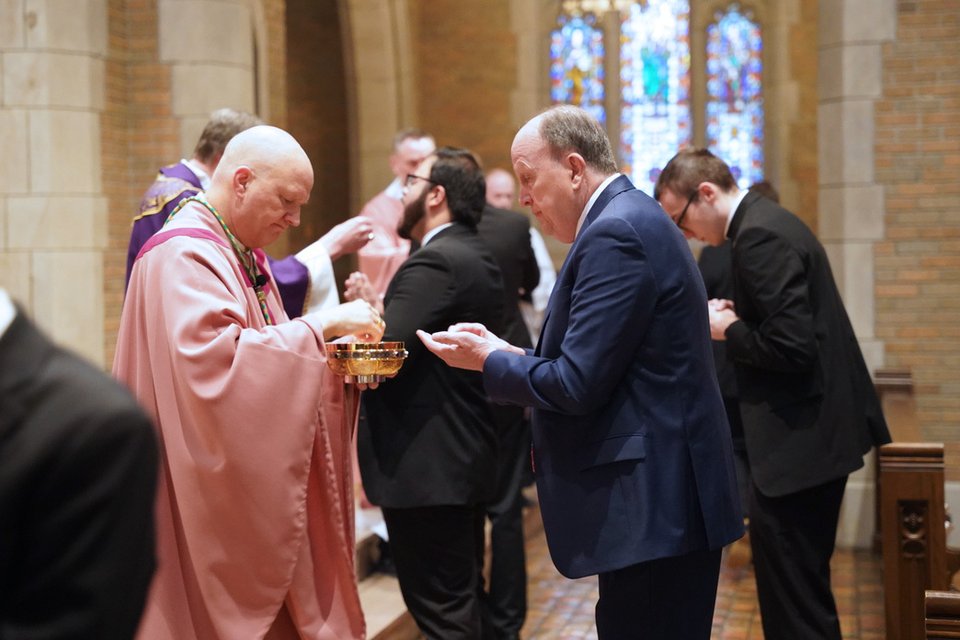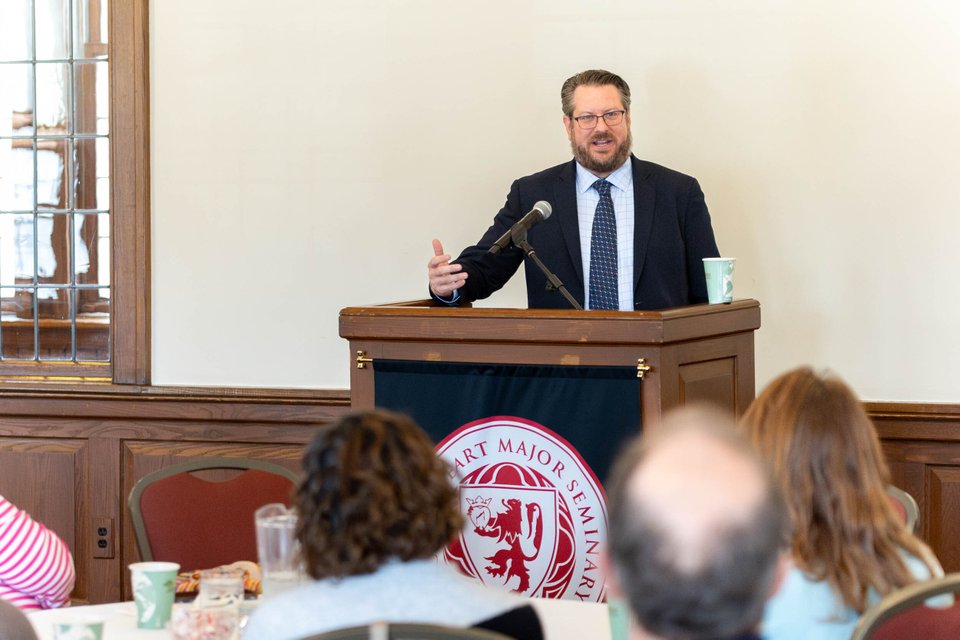Trinity Health's palliative care program 'No One Dies Alone' sends volunteers to be with patients in final hours, give families respite
PONTIAC — Dying is a personal — and often difficult — thing to discuss.
From choosing hospice care and drafting wills to an entire continuum of end-of-life care, there are many views about what’s best.
But there's one thing most people can agree on: no one wants to die alone.
And thanks to a group of volunteers through Trinity Health, no one has to.
In 2005, a team of people at the Catholic health care system started No One Dies Alone, a palliative care program that assigns volunteers to be present with patients who are nearing death, standing by their bedside when family and friends can’t be present.
“No One Dies Alone is a comfort companion program for those patients who don’t have family or whose family can’t be present at the bedside 24/7,” said Barbara Stephen, bereavement specialist in the volunteer department at Trinity Health Oakland and Trinity Health Livonia. “Whether family and friends are out of state, or can’t get in right away, or are in need of respite care, we provide volunteers who can be there if needed. We’re a friend who looks for any kind of distress and keeps them company.”

The program started after Trinity Health’s Palliative Care Program did a study on end-of-life care around the country, noting 50% of patients die in a hospital, and of those, about 10-12% die alone, without family and friends at their side.
Through No One Dies Alone, volunteers keep patients company in their final days, doing everything from reading to patients, holding their hand, or calling a nurse if a patient is in discomfort.
“We are there to be at the bedside,” Stephen told Detroit Catholic. “We do a lot of hand-holding. We don’t do nursing care, but what we do is a lot of talking, prayers if they want, and just being that second set of eyes. If we see some distressing signs, like pain or a need for medical care, we call the nurse. We get a wet washcloth if they are running a fever, or Chapstick when their lips are chapped. We’re there to be that friend by the bedside, keeping an eye on them, letting them know they are not alone.”
No One Dies Alone took a hiatus during the COVID-19 pandemic, when volunteers weren't permitted in hospitals.
The program rebooted last September, operating out of Trinity Health's Oakland (Pontiac) and Livonia locations, with 38 volunteers at Oakland and 29 in Livonia.
No One Dies Alone volunteers typically operate on three-hour shifts and receive a brief report about the patient, including a person's family situation, interests and condition. Volunteers often build a rapport with the patient's family, stepping in to allow family members to get a bite to eat or a change of clothes at home.

“The volunteer who is coming in to (watch over) the person who is dying often is not able to talk to the patient, but they do talk with family, who are grateful they are there," said Kelly Herron, visit coordinator for No One Dies Alone. "They appreciate that someone is stepping into the space for their family, knowing their loved one is being watched over.”
Volunteers are not meant to act as medical personnel or hospice workers. Their work is more a ministry of presence, Herron said.
“As a volunteer, our role is limited because we are there to hold a space,” Herron said. “It’s about showing up and being a companion, being willing to talk about the things they want to talk about. It's about being a friend and putting them first, not being afraid to listen to them talk about what they are feeling as they near the end.”
Sometimes, volunteers can even fulfill special requests, such as having terminal patients see their pets one last time.
“A lot of patients have pets at home, and when we ask them if they have a wish, often they regret they’ll never see their dog or cat again, so we bring the pets in — as long as they are updated on their shots — so they can be with their owner,” Stephen said.
Sometimes, volunteers are a shoulder for family members struggling with the loss of their loved ones, Stephen added.
“We had a young mom who was dying, and she had a 7-year-old daughter, and the dad didn’t know how to tell the daughter,” Stephen said. “(The mother and daughter) shared a birthday, and we knew the mom wasn’t going to make it to the next birthday. We asked what they usually do for their birthday, and the dad said they always have a tea party. So we got the mom out of her hospital gown, had some nice pajamas for her, and got the daughter dressed up. My husband went to Costco to get balloons, and we had a tea party. We took pictures, not only for the daughter to remember, but for the mom to hang onto that memory. It’s not easy losing your mother at 7, but it was a lovely time.”

Most visits are more low-key, but the idea is the same: being with people in their hour of need.
Herron recalls her own experience of being with her own mother when she died, adding it was a comfort to both of them to know she wasn't alone. It was Herron’s time as a No One Dies Alone volunteer that prepared her for her mother’s death, she said.
“When my mom died, I was sitting there with her,” Herron said. “Everyone thought she probably would die soon. It was the middle of the night, everyone went to sleep, and I remember holding my mom’s hand, saying, ‘I’m going to go to sleep. You go to sleep too, and I’ll talk to you in the morning. But I’m right here.’ I was just pulling my hand back to demonstrate that I was falling asleep, but I didn’t close my eyes. I just looked at her, and she opened her eyes and look at me before she died.
“To me, that's why we do this," Herron added. "If at any point, someone is going to open their eyes or squeeze their hand, it’s so comforting that someone is there — that they are not forgotten, that they are not alone, and that it matters to someone as you are making that transition.”

While No One Dies Alone is a comfort to the dying and their families, it's also an added benefit to hospital medical care staff, who appreciate having an extra set of eyes and ears in the room.
"Our nurses are so compassionate, and they just want to be there. They don’t want anybody to be alone when it is the end of someone’s life, but they have a patient load," Stephen said. “So when they see us, they are so excited. When our volunteers come in, the nurses ask if they can get us a cup of coffee, or if we need anything. They take really good care of us, because they appreciate there is always someone there with their patients.”
No One Dies Alone at Trinity Health
If you are interested in becoming a volunteer as a "Compassionate Companion" for the No One Dies Alone Program, please contact Barbara Stephen at (248) 858-3039, (734) 655-2912 or [email protected].
Copy Permalink
Catholic health care












